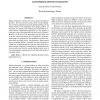Free Online Productivity Tools
i2Speak
i2Symbol
i2OCR
iTex2Img
iWeb2Print
iWeb2Shot
i2Type
iPdf2Split
iPdf2Merge
i2Bopomofo
i2Arabic
i2Style
i2Image
i2PDF
iLatex2Rtf
Sci2ools
127
click to vote
ICIP
2010
IEEE
2010
IEEE
Randomized motion estimation
Motion estimation is known to be a non-convex optimization problem. This non-convexity comes from several ambiguities in motion estimation such as the aperture problem, or fast motion relative to the magnitude of the image gradient. In this paper, we propose a fast random search algorithm to estimate motion. Randomized algorithms are very popular in computer science and optimization for non-convex problems. However, to the best of our knowledge none has been used so far for motion estimation, due to complexity constraints. In this paper, we propose two fast algorithms to perform random search on image pixels. One produces a dense optical flow by matching patches. The other one takes advantage of a quad tree or segmentation tree structure of the image to estimate motion in regions of increasing size. Quantitative and visual results show that the motion obtained seems to be a very advantageous compromise between speed and quality of estimated motion.
Related Content
| Added | 12 Feb 2011 |
| Updated | 28 Feb 2011 |
| Type | Journal |
| Year | 2010 |
| Where | ICIP |
| Authors | Sylvain Boltz, Frank Nielsen |
Comments (0)




